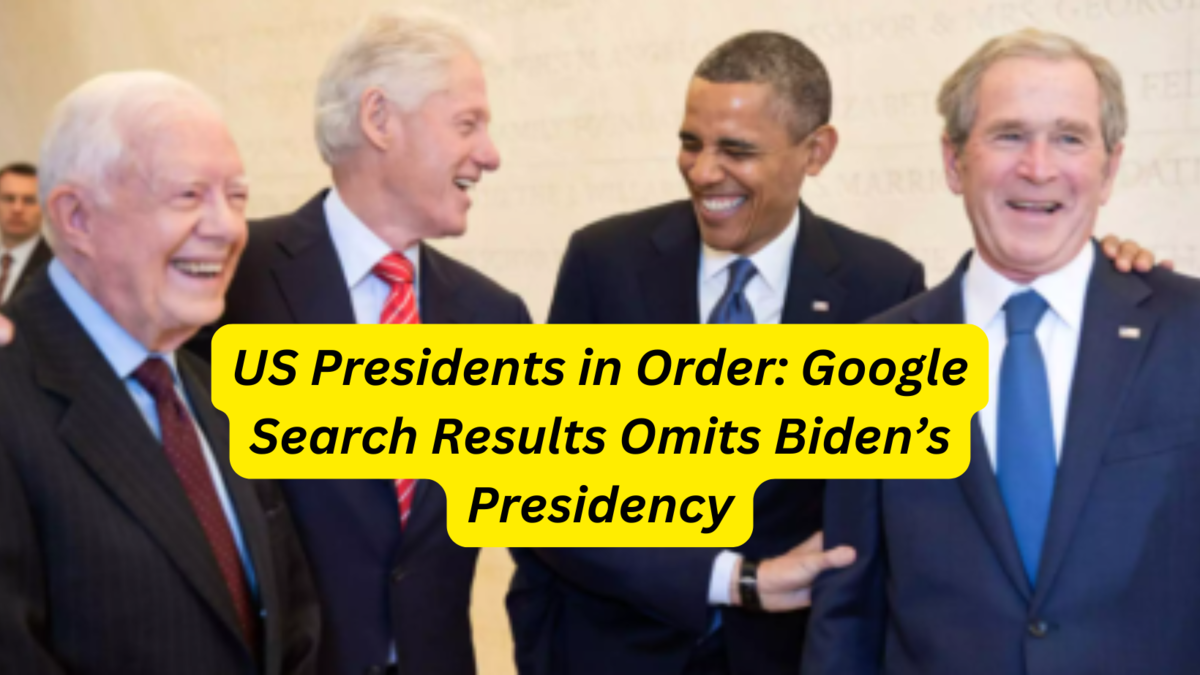US Presidents in Order: On Thursday morning, an unusual glitch occurred that caught the attention of many users across the internet. When searching “US Presidents” on Google, former president Joe Biden’s name was inexplicably missing from the list of U.S. presidents. For a short time, the list erroneously showed President Donald Trump as the last two presidents, with the names of previous presidents like Obama, W. Bush, and Clinton following.
This glitch was promptly fixed around 2:00 AM Eastern time, but for some, this brief incident sparked much concern. Many users, particularly on the social media platform BlueSky, started wondering whether this was a deliberate attempt by Big Tech to downplay Biden’s presidency and perhaps create a narrative that could favor Trump.
The glitch was quickly noticed by users who voiced their outrage, with some speculating it was a high-level hack. The situation became even more charged after the inauguration of Donald Trump as the 47th president. On Monday, several high-profile Silicon Valley CEOs, including Tim Cook of Apple, Mark Zuckerberg of Meta, and Sundar Pichai of Google, were present at the inauguration. Elon Musk, who has made headlines for his controversial stances, also drew attention after making an “odd salute” during the ceremony. The intersection of politics and Big Tech only seemed to add fuel to the fire.
US Presidents in Order:
The Bigger Picture: Power, Influence, and Technology
It’s understandable that incidents like this lead to questions about the power Big Tech has over the narrative of public life. While glitches do happen, and technology is never flawless, one can’t help but consider the impact of these types of occurrences, especially when it comes to historical accuracy and public information. In this case, the glitch led many to feel like their access to the truth was being manipulated, something that brings us to an important topic: the role of technology in shaping political discourse.
It’s not just about information being missing or altered—it’s also about how these actions might influence public opinion and individual rights. When we look at social media platforms, for instance, millions of Meta users reported issues in the days leading up to the glitch. Many were forced to follow the accounts of Donald Trump and Vice President JD Vance against their will, with no way to unfollow. While Meta defended the automatic following by explaining that these accounts are managed by the White House and naturally change hands with a new administration, the lack of transparency and control felt unsettling for some.
For instance, Facebook user Anna Springer voiced her frustration on Threads, saying that despite her repeated attempts to unfollow Trump and Vance, she kept getting re-followed. This situation was not just about users struggling with a bug—it highlighted the wider issue of how people’s digital autonomy is often at the mercy of powerful corporations and political shifts.
Human Rights in the Age of Big Tech
From a human rights perspective, this scenario opens up discussions on digital freedom. The glitch in Google’s search results, and the forced follows on Meta platforms, underscore the significant role technology plays in shaping our engagement with reality. When information is altered, hidden, or controlled by algorithms, it’s not just a technical issue—it’s an infringement on the right to freely access accurate and unfiltered information.
Let’s remember, access to information is one of the foundational elements of human rights. According to Article 19 of the Universal Declaration of Human Rights, “Everyone has the right to freedom of opinion and expression; this right includes freedom to hold opinions without interference and to seek, receive and impart information and ideas through any media and regardless of frontiers.” So, when glitches like these occur, they challenge this fundamental right and spark necessary debates about corporate accountability and ethical digital practices.
How Can We Ensure a Fairer Digital Space?
So, what can we do to increase accountability and ensure that these glitches do not become more common? Here are a few considerations:
- Transparency and Public Engagement: It’s crucial for tech companies like Google, Meta, and others to be transparent about any technical issues they face and to engage with the public to explain what went wrong. Educating users on how data is curated or filtered could help build trust.
- User Autonomy and Control: Users should have more control over the content they see, as well as how and when they interact with public figures on social media platforms. As consumers, our digital rights must be protected to ensure that we’re not manipulated or exposed to unwanted information.
- Accountability Mechanisms: Corporations must have checks and balances in place to prevent any instances where the information is intentionally altered to sway public opinion, even unintentionally. Regular audits of their algorithms could prevent issues like this from escalating.
Conclusion: A Call for Digital Integrity and Human Rights
In a world where digital spaces are becoming as influential as traditional public arenas, ensuring that they remain a reflection of truth and fairness is essential. While glitches and technical issues are bound to happen, it’s crucial that we don’t lose sight of the bigger picture: the right to access reliable and impartial information is a fundamental human right.
In light of this, it’s important that we, as consumers and digital citizens, continue to hold powerful tech companies accountable for their actions and demand more transparency. After all, when we take away the integrity of information, we risk taking away our basic freedoms.
